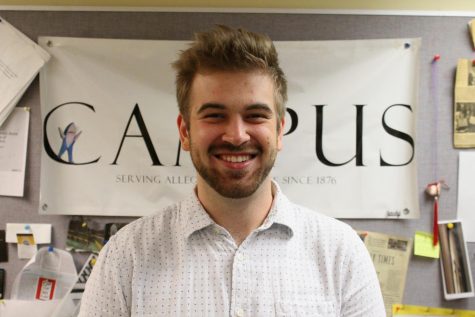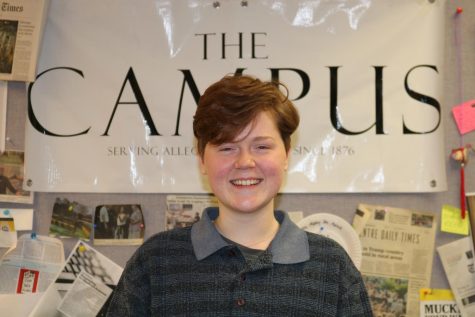ASG, Binnington talk counseling, dining
Dean for Student Experience Ian Binnington addresses the Allegheny Student Government General Assembly on Tuesday, Jan. 24.
The Allegheny Student Government’s guest speaker announced a new telehealth program for students and fielded questions on food insecurity for nearly 45 minutes at the General Assembly on Tuesday, Jan. 24.
Dean for Student Experience Ian Binnington attended GA as a last-minute guest, with the previously-scheduled guest, Assistant Dean for Student Leadership Eric Stolar, stepping back due to unexpected illness.
Binnington brought two updates to conversations that were first reopened for the semester in an email sent out by Dean for Student Life Trae Yeckley and the Student Life team on Jan. 17.
“I recognize that we have two sides of a mental health crisis in America and in higher education,” Binnington said. “One is the demand. The need for mental health services, particularly coming out of COVID. But the second is the supply. There are a lot of people leaving the mental health field, and it is becoming increasingly difficult to staff college counseling centers. … One of the things that we’re going to do is contract with a telehealth company, which is going to be free to you — so no additional cost to students —
that is going to provide you access to physical and mental health services from board licensed physicians and counselors within the state of Pennsylvania.”
Binnington later clarified that students who make use of telehealth service CampusCare — an app employed by numerous colleges and universities across the U.S. — will be able to receive about 36 sessions a year. Currently, the Counseling and Personal Development Center’s website and forms note that the number of appointments a student receives per semester varies based on needs determined by clinical assessment, but is generally three per semester.
Mental health support services provided through CampusCare will have “no billing of insurance, no copay,” Binnington continued. “Obviously, if there are medicines or prescriptions or other things that need to be taken care of, that’s not included.”
Binnington clarified that all enrolled students are eligible for the CampusCare counseling services, and gave special thanks to Yeckley for spearheading the push to incorporate it on Allegheny’s campus.
Also announced was that students will soon have the ability to use a swipe for a full meal at McKinley’s food court through a new meal exchange initiative.
“This is something that’s pretty common on many campuses, and what that basically means is that in McKins, at probably all of the stations — I don’t want to commit to all of the stations because I’m not sure about (Bento Sushi) — but all of the stations, there will be an option for you to get a full meal and use a swipe,” Binnington said.
Binnington explained that once the initiative is in place, there will be a standard menu of one or two items — including vegan and vegetarian options — but the items will start rotating once the infrastructure is in place. He added that AC Express — the market at McKinley’s — will have a similar meal swipe option, noting that “a sandwich, a bag of chips and a drink” is an approximation of what these meals will look like.
Both of these services will launch on Feb. 1, according to Binnington.
Many constituents raised concerns about food insecurity on campus following the announcement of the upcoming meal exchange program with varying responses. ASG President Veronica Green, ’23, questioned whether the new swipe option at McKinley’s will raise meal plan prices in following semesters.
“I will tell you the honest truth, which is I don’t know,” Binnington said. “ … What I will say is that this meal exchange doesn’t increase costs. It’s packaging food in a different way and having you pay for it in a different way. It’s the same food.”
L Hudson, ’23, said that he has heard more from others about food insecurity on campus since Aramark took over as the school’s dining service provider, and suggested that the school is trying to revert some things back to the way they were with Parkhurst — such as having grab-and-go meals available in both markets for a swipe — to cover for that.
“(Food insecurity on campus) has gotten so bad that I know students that are stealing food in order to survive,” Hudson told Binnington during the meeting. “I’m wondering if you think that this meal-type offering provides students with enough food to keep themselves full because I know that people are feeling tight on both swipes and Munch Money now since our marketplace prices are pretty significant.”
Binnington affirmed that food insecurity is neither acceptable nor tolerable on campus. Binnington added that he knew some food plans that have been grandfathered in for seniors “are simply not big enough for anybody to survive on.”
“I don’t know that this (meal exchange program) will be a total solution to the problem, but it is a step along the road,” Binnington said.
Later in the conversation, Binnington remarked that of Allegheny’s current meal plans — options A, B or C — none with the exception of A are meant to support a full three meals a day for students. Binnington said that it is implied both by Allegheny and other institutions who have similar meal plan programs that students who select a smaller meal plan are expected to cook or purchase their own food.
Plan A costs $3,690 per semester and provides 10 meal swipes and $110 in Munch Money per week. Plan B costs $3,259 for 7 meal swipes and $90 in Munch Money, and plan C costs $3,110 for 5 meal swipes and $60 in Munch Money, according to Financial Services.
Binnington suggested that at one point, it was considered to give first-year students only the option of plan A so they could reliably have three meals a day.
Co-Director of Student Affairs Cam Lesher, ’24, remarked that food insecurity goes beyond simply having good food to eat on campus, insinuating that meal plan prices should also be put under the microscope.
“I wouldn’t be here if I had to choose meal plan A as a freshman,” Lesher said.
At the end of the discussion, Green stated that she had run some numbers on Allegheny’s current meal plans and had also compared them to those offered at Clarion University, which also employs Aramark as the dining service provider.
Green found that meal plans which provided similar value at Pennsylvania Western University Clarion cost “significantly less” — the three plans available on PennWest Clarion’s dining site range in cost from $1,800 to $2,170. She also said that one swipe under meal plan A came out to the cost of $12, while under meal plan C, a swipe cost $27.
During constituent comments, Binnington said that he has had no in-person conversations with students regarding food insecurity on campus. Class of 2026 Senator Lorenzo Scarnati suggested a Google Form which would allow students a direct, confidential line of communication to the proper channels, which would then allow their individual cases to be evaluated more closely. Binnington took note, and said he would be open to such a system.
GA also unanimously approved the signing of a petition in support of the Indian Child Welfare Act, which was brought to the attention of Green by Colorado State University’s student government. ICWA ensures that orphaned Native American children are placed in the care of either familial relations or close tribal relations. Four cases heard by the U.S. Supreme Court on Nov. 9 argued that the act “illegally discriminates on the basis of race, oversteps federal jurisdiction, and prioritizes the interest of tribes over the needs of the Native children it purports to protect,” according to TIME. Green said that the petition not only shows support, but will hopefully make dissenting opinions to the hearings more visible before the release of a ruling in July.
In the cabinet reports section of the meeting, Director of Diversity and Inclusion Jaelyn Valentin, ’25, made reference to a discussion that had taken place at the Jan. 17 GA regarding the installation of a prayer space in the Lawrence Lee Pelletier Library.
Valentin said she had a conversation with Pelletier’s Director of Public Services Aimee Reash about providing additional space for students to pray in a location rather than the Prayer and Meditation House. Valentin said that Reash said there was no space in the library, suggesting that there was a personal disagreement involved. Reash said it did not fit the needs of all students, according to Valentin.
Valentin also explained that the ICA was no longer pursuing the additional prayer room, as they did not want to split the Muslim population’s prayer space across campus.
“Going forward, personal belief should not be a deciding factor in processes regarding student wishes or concerns,” Valentin said.
Reash confirmed that the conversation did occur but declined to comment, instead directing any further questions to Provost and Dean of the Faculty Angela Haddad.
“I and the college are committed to the religious diversity of students,” Haddad in said in an interview on Thursday, Jan. 26.
In order for a space to be permanently allocated to a religious organization on campus, the group must go through Director of Spiritual and Religious Life and Assistant Professor of Arabic Sami Alkyam, as Haddad cannot solely make decisions on space use in academic buildings, she explained. Haddad said that Alkyam had this exact type of conversation with the students seeking the space, and then further advising by Yeckley or Binnington. Alkyam and the convened students independently decided against pursuing the prayer room further.
The meeting adjourned at 8:46 p.m.

Roman Hladio is a senior from Wexford, Pennsylvania. He is studying English with a creative writing emphasis, and completing requirements for a Journalism...

Anna Westbrook is a sophomore from Washington, D.C. They are majoring in Environmental Science and Sustainability with a double minor in Political Science...









